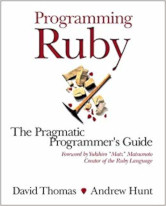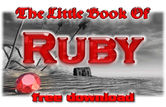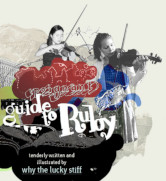Last Updated on November 22, 2025
6. Programming Ruby – The Pragmatic Programmer’s Guide by David Thomas & Andrew Hunt

No roundup of free Ruby books would be complete without including Programming Ruby – The Pragmatic Programmer’s Guide. It’s the original tome and complete reference for Ruby.
The book offers an excellent tutorial on using Ruby. It offers detailed documentation on built-in classes, modules and methods. And there’s complete complete of Ruby’s standard libraries.
The material is distributed under the terms of the Open Publication License.
7. The Little Book of Ruby by Huw Collingbourne
 The Little Book Of Ruby is a PDF eBook which will guide you through the fundamentals of Ruby programming.
The Little Book Of Ruby is a PDF eBook which will guide you through the fundamentals of Ruby programming.
Starting with the basics (strings, numbers, objects and methods) it quickly moves on to explain all you need to know to create your own class hierarchies, use arrays, hashes, iterators, modules, mixins and much more.
8. why’s (poignant) Guide to Ruby by why the lucky stiff
 why’s (poignant) Guide to Ruby is an unconventional but interesting open source book that will teach you Ruby through stories, wit, and comics. The material is pitched at an introductory level.
why’s (poignant) Guide to Ruby is an unconventional but interesting open source book that will teach you Ruby through stories, wit, and comics. The material is pitched at an introductory level.
There’s lots of bizarre humor and narrative side tracks.
Originally created by why the lucky stiff, this guide remains a classic for Ruby learners. But it’ll be an acquired taste for many.
It’s an actively maintained fork of the original publication.
9. Kestrels, Quirky Birds, and Hopeless Egocentricity by Reg “raganwald” Braithwaite
 This book is made out of nearly 100% recycled blog posts.
This book is made out of nearly 100% recycled blog posts.
It collects Reg “Raganwald” Braithwaite’s series of essays about Combinatory Logic, Method Combinators, and Ruby Meta-Programing into a convenient and inexpensive e-book.
The book has a suggested price of $7.99 but it’s available to download for free.
And more importantly it’s published under the MIT License, so it’s open source goodness.
10. Ruby Programming by Wikibooks.org

Ruby Programming teaches you how to install and begin using Ruby. Getting into the meat of the book in the Basic Ruby section, you’ll learn the main features of Ruby’s syntax. There’s reference material too.
There’s also some coverage of slightly more advanced topics with in-depth tutorials including unit testing, building C extensions, and embedding Ruby within a C program.
Next page: Page 3 – Learn to Program and more books
Pages in this article:
Page 1 – My Strongest Recommendations
Page 2 – Programming Ruby – The Pragmatic Programmer’s Guide and more books
Page 3 – Learn to Program and more books
Page 4 – Developing Games With Ruby and more books
All books in this series:
| Free Programming Books | |
|---|---|
| Ada | ALGOL-like programming language, extended from Pascal and other languages |
| Agda | Dependently typed functional language based on intuitionistic Type Theory |
| Arduino | Inexpensive, flexible, open source microcontroller platform |
| Assembly | As close to writing machine code without writing in pure hexadecimal |
| Awk | Versatile language designed for pattern scanning and processing language |
| Bash | Shell and command language; popular both as a shell and a scripting language |
| BASIC | Beginner’s All-purpose Symbolic Instruction Code |
| C | General-purpose, procedural, portable, high-level language |
| C++ | General-purpose, portable, free-form, multi-paradigm language |
| C# | Combines the power and flexibility of C++ with the simplicity of Visual Basic |
| Clojure | Dialect of the Lisp programming language |
| ClojureScript | Compiler for Clojure that targets JavaScript |
| COBOL | Common Business-Oriented Language |
| CoffeeScript | Transcompiles into JavaScript inspired by Ruby, Python and Haskell |
| Coq | Dependently typed language similar to Agda, Idris, F* and others |
| Crystal | General-purpose, concurrent, multi-paradigm, object-oriented language |
| CSS | CSS (Cascading Style Sheets) specifies a web page’s appearance |
| D | General-purpose systems programming language with a C-like syntax |
| Dart | Client-optimized language for fast apps on multiple platforms |
| Dylan | Multi-paradigm language supporting functional and object-oriented coding |
| ECMAScript | Best known as the language embedded in web browsers |
| Eiffel | Object-oriented language designed by Bertrand Meyer |
| Elixir | Relatively new functional language running on the Erlang virtual machine |
| Erlang | General-purpose, concurrent, declarative, functional language |
| F# | Uses functional, imperative, and object-oriented programming methods |
| Factor | Dynamic stack-based programming language |
| Forth | Imperative stack-based programming language |
| Fortran | The first high-level language, using the first compiler |
| Go | Compiled, statically typed programming language |
| Groovy | Powerful, optionally typed and dynamic language |
| Haskell | Standardized, general-purpose, polymorphically, statically typed language |
| HTML | HyperText Markup Language |
| Icon | Wide variety of features for processing and presenting symbolic data |
| J | Array programming language based primarily on APL |
| Java | General-purpose, concurrent, class-based, object-oriented, high-level language |
| JavaScript | Interpreted, prototype-based, scripting language |
| Julia | High-level, high-performance language for technical computing |
| Kotlin | More modern version of Java |
| LabVIEW | Designed to enable domain experts to build power systems quickly |
| LaTeX | Professional document preparation system and document markup language |
| Lisp | Unique features - excellent to study programming constructs |
| Logo | Dialect of Lisp that features interactivity, modularity, extensibility |
| Lua | Designed as an embeddable scripting language |
| Markdown | Plain text formatting syntax designed to be easy-to-read and easy-to-write |
| Objective-C | Object-oriented language that adds Smalltalk-style messaging to C |
| OCaml | The main implementation of the Caml language |
| Pascal | Imperative and procedural language designed in the late 1960s |
| Perl | High-level, general-purpose, interpreted, scripting, dynamic language |
| PHP | PHP has been at the helm of the web for many years |
| PostScript | Interpreted, stack-based and Turing complete language |
| Prolog | A general purpose, declarative, logic programming language |
| PureScript | Small strongly, statically typed language compiling to JavaScript |
| Python | General-purpose, structured, powerful language |
| QML | Hierarchical declarative language for user interface layout - JSON-like syntax |
| R | De facto standard among statisticians and data analysts |
| Racket | General-purpose, object-oriented, multi-paradigm, functional language |
| Raku | Member of the Perl family of programming languages |
| Ruby | General purpose, scripting, structured, flexible, fully object-oriented language |
| Rust | Ideal for systems, embedded, and other performance critical code |
| Scala | Modern, object-functional, multi-paradigm, Java-based language |
| Scheme | A general-purpose, functional language descended from Lisp and Algol |
| Scratch | Visual programming language designed for 8-16 year-old children |
| SQL | Access and manipulate data held in a relational database management system |
| Standard ML | General-purpose functional language characterized as "Lisp with types" |
| Swift | Powerful and intuitive general-purpose programming language |
| Tcl | Dynamic language based on concepts of Lisp, C, and Unix shells |
| TeX | Markup and programming language - create professional quality typeset text |
| TypeScript | Strict syntactical superset of JavaScript adding optional static typing |
| Vala | Object-oriented language, syntactically similar to C# |
| VHDL | Hardware description language used in electronic design automation |
| VimL | Powerful scripting language of the Vim editor |
| XML | Rules for defining semantic tags describing structure ad meaning |
